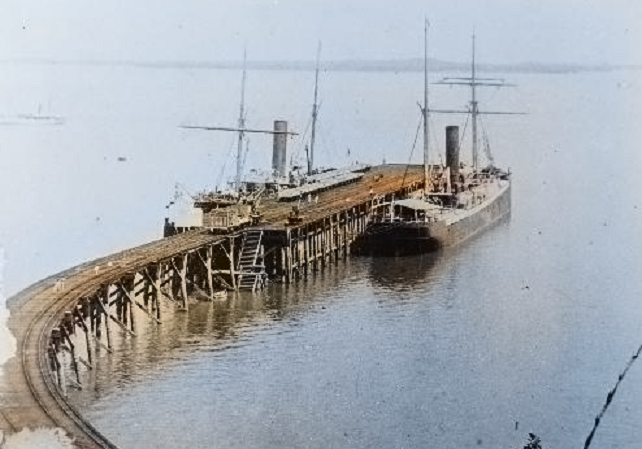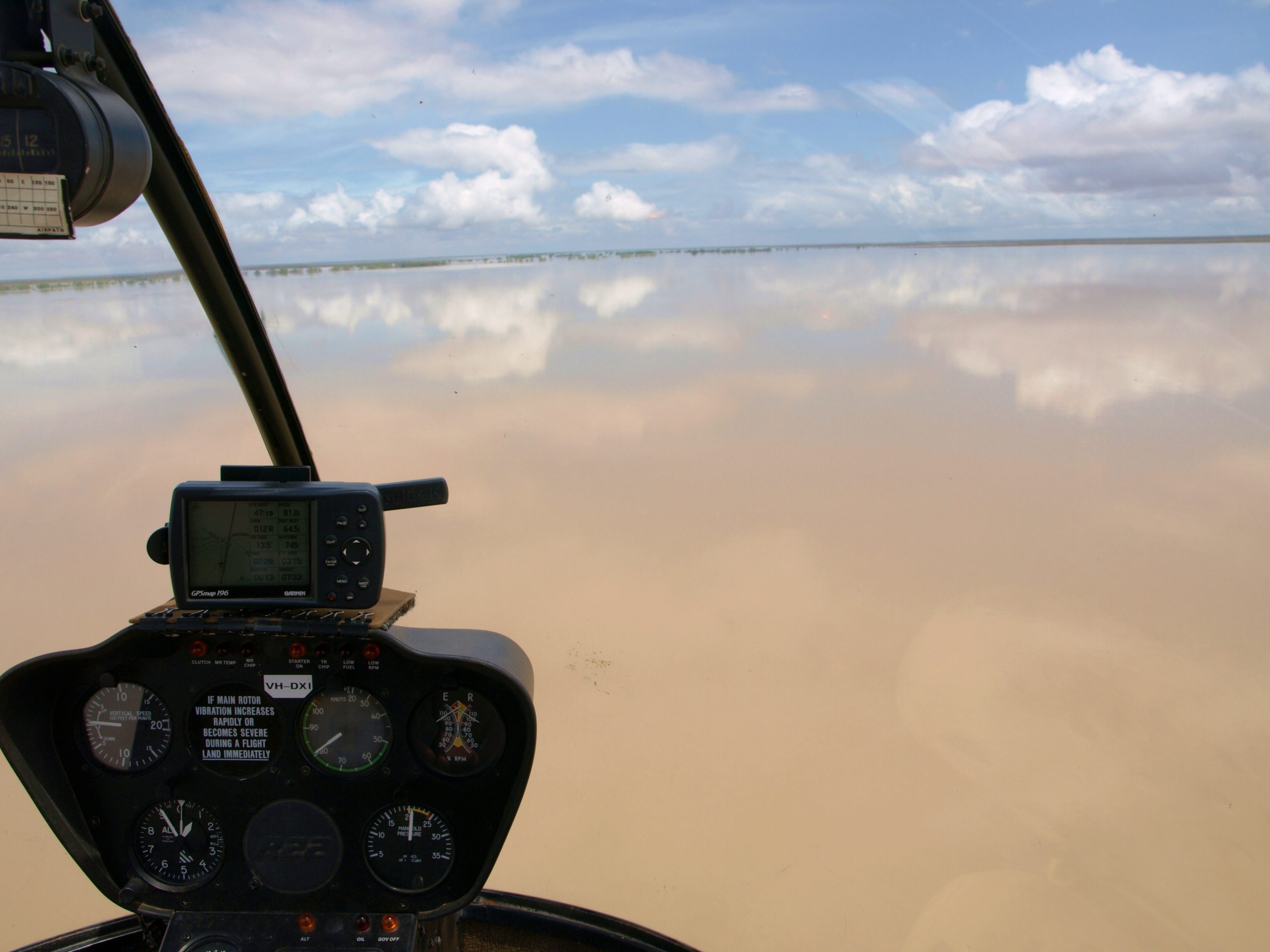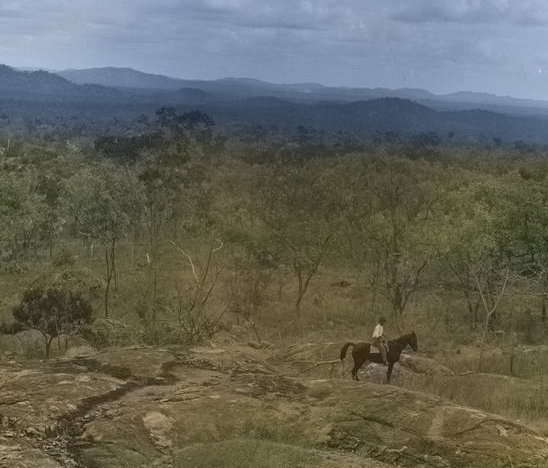
Port Darwin jetty with S.S.Taiyuan and Catterthun. Railway trucks on the jetty. Taken from Stokes Hill. (NT Library)
A letter from Sydney arrived on the Noosa, when she next chugged her way up Arthur’s Creek to the Doomadgee landing. My superiors had written to enquire of my progress and to request the despatch of a substantial report. Time was slipping away, I realised, and in the following days I put in a serious effort to complete this task, despite my fervour to hear the rest of Joe’s story from Kitty.
My handwritten dictionaries of the Waanyi and Gangalidda languages now exceeded three thousand words, though there were aspects of sentence construction and general grammar rules that eluded me. I practiced my skills on Stanley and Willie, often provoking fits of laughter at my earnest but misguided attempts to speak as they did.
More time passed than I had anticipated, and the next time I went down to Kitty’s camp, a couple of fresh plugs of tobacco in my pockets, her camp was deserted, the ashes in her fireplace cold. Charley admitted to taking her across the floodwaters to the other side in his canoe. I asked him where and why she had gone and he just shrugged and muttered something about ‘she ‘goin’ walk to see if the bush plum all the same ripen up.’
Yet, there was more to it than that, I could see in his face.
For some weeks Kitty was absent from her place near the creek. I despaired, not only for her, but of ever hearing the rest of Joe’s story. The only positive was that I continued to apply myself to my work, and I spent my spare time writing down the aspects of Joe’s story that she had already told me.
Then, one day in early March, Kitty returned, walking across the still boggy saltpans. I saw her coming, a lone stick-figure in a glare of white haze. She was, I soon found, thinner even than before, but seemed to have regained some peace in her heart.
I gave her a day or two to recover, then took her a fresh-baked loaf of bread, some tea and tobacco. She was keen to talk, settling down by the fire, filling her pipe and asking me questions about happenings at the mission while she was gone.
Then, her pipe drawing nicely, she settled down on a ragged old tartan blanket and started to talk.
Harry Hasenkamp, she told me, along with Joe, boarded the SS Catterthun, a steamship bound for Southern Ports. Pride of the Eastern and Australian Steamship Company, the Catterthun was a two-thousand-ton iron passenger steamer, three hundred feet long, and with a crew of mainly Malays and Chinese. I know for a fact that she later sank off Port Stephens, New South Wales, with a significant loss of life.
Joe was locked in the brig, joined occasionally by drunks or disrespectful seamen. This steel enclosure, surrounded by pipes carrying water and steam, was seething-hot all day and night. Joe, regarded by reputation as a dangerous prisoner, remained chained on the orders of Captain J Miller. Hasenkamp, meanwhile, enjoyed the facilities of the second-class lounge.
At Thursday Island Hasenkamp and his prisoner were transferred to a smaller steamer, the Black and Noble-built Truganini. At two hundred and three gross tons and with a beam of just twenty feet, she was just one-tenth the size of the Catterthun.
The Truganini had no brig, and Joe was chained to a pipe near the funnel, vomiting into a bucket from rough conditions and the yawing, pitching progress of the steamship.
In Normanton, as they came off the ship and onto the main wharf, Joe saw that a crowd had formed outside the Burns and Philp warehouse. Some had come to welcome loved ones but most were there to gawk at Joe.
As he passed, Joe saw Kitty and Henry, waving to their son, eyes filled with tears. His heart beat like the hooves of a galloping horse to see them again.
The moment didn’t last. A police wagon was on hand to carry Joe back to the Normanton gaol, and Joe managed his first wry smile in some weeks to see that the height of the wall had been raised by some three feet in preparation for his return.
Inspector Brannelly himself took possession of Joe, and all the local constables turned out to watch while Joe was forced to stand on the front verandah of the police station, still chained and wearing Territory prison fatigues.
‘Joe Fleck, scon are pleased ter clap yer in custody wha yer belong. Justice ‘as been delayed, but ‘ill be al’ de firmer for dat.’
Joe said nothing, just looked at the ground so fixedly that Brannelly barked at Hasenkamp to grasp the prisoner’s chin and drag his eyes up. This was done so roughly that Joe all but fell, earning himself a clip on the side of the head.
‘That’s better,’ said Brannelly. ‘You nade ter learn respect. You’ve caused us al’ a deadly dayle av mischief, but oi ‘ope yer nigh understan’ dat de law ‘ill win oyt, naw matter wha yer run ter. Is dat de case?’
Joe had dropped his eyes again, and a great deal of trouble was taken by two men to not only raise Joe’s eyes, but to forcibly waggle his chin up and down as if to say yes.
Brannelly, tired of the intransigence of the prisoner, ordered him to be taken and incarcerated until a court date could be decided. Joe was unchained, marched out the back inside the enclosure, and placed in Cell Three. The door slammed closed behind him.
The sullenness left Joe. His mood was different. Seeing first these more familiar bushlands on the banks of the Norman River, then Kitty and Henry, had awakened a fire inside his heart. He prowled. He glared. He vowed that these walls would not contain him.
‘You must be Joe Flick,’ said a voice.
Joe turned to see a much older man with a long grey beard, an unlit clay pipe in one hand. ‘And who are you?’
‘I’m Ted Bell, you might have heard of me when I was on the road with a bullock team.’
Joe’s eyes narrowed suspiciously. ‘What are you in here for?’
‘I lighted a shanty afire on the Saxby River – drunk as a king when I done it, an’ the German shanty keeper was burned to death.’
Joe paled, his own crimes seemed minor in comparison. ‘They’ve charged you with murder then?’
‘Yeah, but that’s not all,’ admitted Bell. ‘I’m charged with murder, arson and rape. I’ll prob’ly hang from a rope before the month is out.’
Ted Bell gave Joe the creeps, and his desire to leave that cell grew stronger. He paced the floor, looking for a way out. The walls were solid, sheathed with sheet metal. The windows were lined with iron bars three-quarters of an inch thick. It was only the floor that gave him hope, for the cells were set up on stumps. The boards were two inches thick, but in one corner the termites had been busy, and the wood was not as strong as it had once been.
‘If you’re thinking of breaking out,’ said Ted Bell. ‘Count me in.’
Joe nodded, but he was already deep in thought.
The following day, Joe was remanded in custody by the police magistrate, for Judge Cooper was out of town, over in Cairns, and the much-anticipated trial would have to wait. Joe behaved well in the exercise yard, and caused no trouble. Within the week he was allowed visitors. Kitty and Henry came on the very first day that this restriction was relaxed. There was no visiting room, just a few chairs in a corner of the yard, near the water tank.
Mother and son embraced until the gaoler tried to separate them, but Henry growled. ‘Leave ‘em alone. She hasn’t held her boy for sixteen long months, and who would deny a mother from her own flesh and blood?’
When their time was up Joe and Kitty embraced again. He whispered in her ear. ‘Please help me. I need a thin, light saw blade. Throw it over the wall down the southern end, and I’ll find it when they let us out at exercise time.’
This of course, was a dilemma for Kitty, for she had seen what happened last time she had incited Joe to escape. The sensible thing was to let him take his punishment. But there was something else at work inside her. Joe was on a course that she could not control. If she refused to supply the saw blade he would try some other way. She had seen in Joe’s eyes that he had reached the end of his forbearance.
Strangely, when Kitty and Henry left the gaol that day, no sooner had they returned through the police station to where their horses were waiting out the front, that Kitty fell to her knees, and let out a terrible wail.
She told me that it had suddenly struck her that she would never see her boy alive again.
The saw blade that Kitty and her husband threw over the wall the next day, was fine-toothed and flexible, made for a small coping saw and scarcely adequate for the task. The cutting of the boards, furthermore, was impossible to attempt without involving Ted Bell.
‘I don’t care if you escape with me or not,’ said Joe to his cell mate. ‘But keep your mouth shut.’
‘I won’t say a word,’ said Ted Bell, ‘an’ like as not I’ll follow you out.’
The sawing made noise, so Joe was forced to do his secret work only in the time between lockdown and lights out, when there was still activity in the cells. He also had to be careful not to break the tiny blade. Each night he disguised his work with saw dust mixed with soap.
On the third night he left just enough material to hold the planks in place, then lay in his cot, feigning sleep until the small hours of the morning. He slipped out of bed, pushed the two sections of floor timber through to the ground, then went to wake up Ted Bell.
‘I’m going now. Follow if you want to.’
With nothing to take but the clothes he wore, Joe slithered through the hole in the floor, then wriggled under the building, emerging near the station’s back verandah. Getting out of the enclosure was the next problem, but Joe had a plan. He hurried to the rear of the main barracks building, where on one side stood a corrugated water tank. He opened the tap, letting the water drain out onto the grass.
While he waited, he saw Ted Bell emerge from under the cell block, then lost sight of him in the shadows. He didn’t care, the water tank idea was his, and he didn’t want to share it.
When the tank was empty, he silently tipped it onto its side and began to roll it towards the wall, where he intended to use it as a ladder.
Ted Bell, in his work as a bullock driver, had made money by carefully weighing options; profit against risk; effort against return. Before blindly following Joe, he wondered if it might not be better to create himself a bargaining chip when his case came up in court.
Sounding the alarm that Joe was escaping was just such an opportunity. Surely the judge would look kindly on him for doing so, and he had no real desire to live the rest of his life on the run for murder. Without any further thought, keen to act before the moment had passed, Ted squeezed through the gap, wormed under the building, and slunk through the shadows, around the corner of the police quarters, finally rapping on one of the police constable’s barred windows.
Joe was busy clambering up the water tank when he heard a commotion. The back door of the police station opened.
‘There he is,’ cried Ted Bell to the half-dressed troopers who accompanied him. ‘I told you that he was escaping!’
Joe redoubled his efforts, pushing the tank against the wall, clambering up on top, using this extra height to grip the top of the extended wall. He tumbled up and over the Normanton gaol wall for the second time, landing safely, rolling and getting up. Unlike the last occasion he did not look for a hiding place or a horse, he just started to run for the scrub at the southern end of town, away from the river.
Before thirty minutes had passed he was two miles away, starting to anti-track as he went. Already he could hear the sound of hoof beats in the distance as mounted police galloped on his trail. Then, worse, the sound of dogs barking, taking his scent.
With sweat running down his face, and his breath coming in torrid gusts, Joe swore that he would die rather than be captured again. That he would never wear an iron chain again as long as he lived.
With that declaration, he became an outlaw. There was no turning back from that moment.
Continues next week
©2019 Greg Barron


